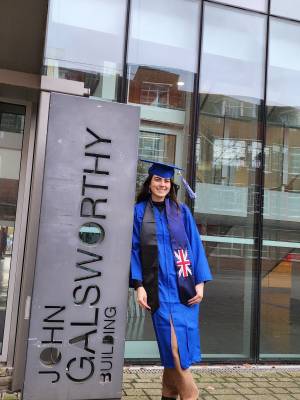Academic programme
Please use the links below:
Subject areas
Kingston University is particularly well known for its extensive and diverse range of subject areas. There are four faculties (shown below) made up of schools specialising in specific subject areas, most of which are open to Study Abroad students.
Kingston School of Art
- Architecture and Landscape
- Arts, Culture and Communication
- Cultural Studies and Creative Industries
- Design School
Business and Social Sciences
- Kingston Business School
- Law, Social and Behavioural Sciences
Engineering, Computing and the Environment
- Computer Science and Mathematics
- Engineering and the Environment
Health, Science, Social Care and Education
- Education*
- Life Sciences, Pharmacy and Chemistry
- Midwifery*
- Nursing*
- Social Work and Social Care*
*Not available to Study Abroad students
Period of study
The first step is to decide how long you wish to study abroad. There are three possible study options:
| Study option | Length | Study period |
|---|---|---|
| 1 | Whole year | September – June |
| 2 | Autumn (fall) | September – December |
| 3 | Spring semester | January – April |
The University's standard academic year runs from September to June, with teaching taking place in two semesters.
Modules
Classes at Kingston University are taught as part of a highly-structured degree programme, made up of individual components called modules. Each module has defined content, contact hours, learning outcomes and assessment.
Modules are measured in credits. The table below shows how our credits correlate with US semester credit hours and the European Credit Transfer System (ECTS).
| Study option | Kingston credits | US | ECTS |
|---|---|---|---|
| 1 | 120 | 32 | 60 |
| 2/3 | 60 | 16 | 30 |
| 15 | 4 | 7.5 |
Note that some modules have different credit values, dependent upon the length of the module and the intensity of delivery.
For Study Option 1, you will normally enrol for the equivalent of 120 Kingston credits. For options 2 and 3, this figure will be 60 Kingston credits.
Selecting modules
Modules are designed to be studied at certain stages in an undergraduate programme. Consequently, modules are grouped in levels. Each module is coded from 4 to 6, which indicates its suitability for a first-year, a second-year or a third-year UK student respectively.
UK students generally specialise in secondary (high) school. This is much earlier than, for example, in North America. As such, UK students have normally chosen their major before they enter university. For example, a student studying a psychology degree may typically study 24 modules over three years focusing upon different aspects of psychology. This is very different from a liberal arts curriculum.
The table below shows the correlation between the different systems, where AB = subject code:
| UK education | UK FHEQ* | US education | Kingston module coding | Suitability for Kingston module |
|---|---|---|---|---|
| Final year of secondary (high) school | Freshman year at college/university | n/a | n/a | |
| First year of university study | Level 4 | Sophomore | AB4000 | No prior knowledge (or some introductory for specific areas) in the subject |
| Second year of university study | Level 5 | Junior | AB5000 | Intermediate level – some relevant background/completion of introductory module |
| Third and final year of university study | Level 6 | Senior | AB6000 | Advanced level – strong academic background in the subject |
*Please note that the UK higher education sector has categorised the main higher education qualifications into levels, and is called the Framework for Higher Education Qualifications (FHEQ). These level descriptors (4–6 corresponding to a three-year undergraduate degree programme) are used extensively at Kingston.
If you are a junior or a senior, bear in mind that Level 6 modules are final-year courses taken only by students majoring in the subject. Freshmen and sophomores will not normally be approved to take Level 6 modules.
Tutors in your own academic departments at your home university can often give advice as to which courses could be of special value to you, and the SAIL Office team is happy to provide detailed guidance as to which modules will be a good fit to match your background and interests.
You must take a minimum of 12 US (22.5 ECTS) credits in each semester and normally no more than 16. In order to allow for non-availability, non-suitability or a potential timetable clash, it is recommended that you select modules as follows:
| Study option | Number of modules required in application |
|---|---|
| 1 | 8 (four first choice, four second choice) |
| 2, 3 | 8 (least four first choice, three second choice) |
List your selection in order of preference. Please make it clear if you have specific alternatives should your first choice not be available.
All of our modules are under continual review and improvement, so some of the details on this website may have been revised (although we make every effort to keep it up to date). However, an alternative similar module may be available and you will be informed of this when an offer is made to you.
Using the module directory
The modules are categorised firstly by faculty, then by subject alphabetically. Within each subject area, modules are listed by level, then chronologically by code.
Below is an example of the typical layout for a module in the module directory.
| Module code | This identifies the module, e.g. EL5003 |
|---|---|
| Module title | The formal name, e.g. Late Medieval to Early Modern Literature |
| Credits | The number of credits that the module is worth in US semester credit hours and in ECTS credits. |
| Level | FHEQ value (between 4–6) |
| Prerequisites | Details any prior knowledge required in order to study the module and/or other Kingston modules which must have been studied previously, e.g. previous study in English Literature |
| Suitability | This indicates the suitability of a module for your intended study option:
|
| Course content | Explains the academic content of the module |
| Teaching | How the module is taught, e.g. lectures, seminars etc. |
| Assessment | Explains the mechanism(s) for assessing the final grade for the module, e.g. exam, 3,000-word essay for each study option offered. |
Assessment
Modules have their own specified assessment requirements. These can vary between schools and faculties, but may include a mixture of written papers, examinations, special tests, presentations or productions, or other practical assignments (portfolios).
Kingston has one main examination period each year, from late April until the end of May. Students attending for just the fall (autumn) semester (study option 2), or the spring semester (study option 3) and enrolled in modules which are suitable for this length of study, will be given an alternative method of assessment. Indicative details of these will be available in each module descriptor.
Please note that the online submission deadline for assessments (for study options 2 and 3) may occur after the teaching period has finished.
Students attending for the whole academic year (study option 1) must complete all coursework and take all final examinations held in April/May) as required.
Credit transfer and Transcripts
Unlike the grading system in some international countries, marks in UK universities generally range between 40% (passmark) and 70%. Consequently, a grade of 60–69% is considered very good.
At the end of your study period, the SAIL Office team will automatically produce a transcript showing the US credit value and a letter grading designed to be compatible with the US system, shown below. If you are attending a European or a non-US institution, we can provide the transcript in ECTS credit instead.
If you are a former International Exchange or Study Abroad student and require your transcript, please contact us.
| US letter grade | Kingston (percentage) | Qualitative grade |
|---|---|---|
| A+ | 80+ | Equivalent to UK first class |
| A | 70–79 | Equivalent to UK first class |
| A- | 65–69 | Equivalent to UK upper second class |
| B+ | 60–64 | Equivalent to UK upper second class |
| B | 55–59 | Equivalent to UK lower second class |
| B- | 50–54 | Equivalent to UK lower second class |
| C+ | 47–49 | Equivalent to UK third class |
| C | 43–46 | Equivalent to UK third class |
| C- | 40–42 | Equivalent to UK third class |
| D | 35–39 | Unclassified pass |
| F | Below 35 | Fail |
| I | Incomplete | Incomplete |
| W | Withdrawn | Withdrawn |
Learning environment
Teaching methods vary from subject to subject, although most involve a mixture of formal lectures and smaller seminars, which provide the foundation for further independent study. Independent study is a major component of the British education system and you may find this both challenging and rewarding. Other teaching methods include:
- online references and teaching
- language suite work
- laboratory work
- engineering workshops
- computer workshops
- art and design studio work.
Add and drop
During the application process, we take a lot of time to ensure that you have an appropriate study plan of modules when we make you an offer, to ensure that you are correctly matched academically based upon your experience and previous study.
However, when you start your studies at Kingston, if for any reason you are not happy with a particular allocated module, there is an add and drop period at the start of the semester to allow you to make minor changes.
Contact us
Study Abroad International Learning Office
Enquiries about coming to Kingston as a visiting student:
- Enquiries about coming to Kingston as a Study Abroad/International Exchange student: +44 (0)20 8417 3629/3650
- Enquiries about going abroad as a Kingston student: +44 (0)20 8417 3626
- Contact Kingston University
- How to get to Kingston University
Contact us
Study Abroad International Learning Office
Enquiries about coming to Kingston as a visiting student:
- Enquiries about coming to Kingston as a Study Abroad/International Exchange student: +44 (0)20 8417 3629/3650
- Enquiries about going abroad as a Kingston student: +44 (0)20 8417 3626
- Contact Kingston University
- How to get to Kingston University

